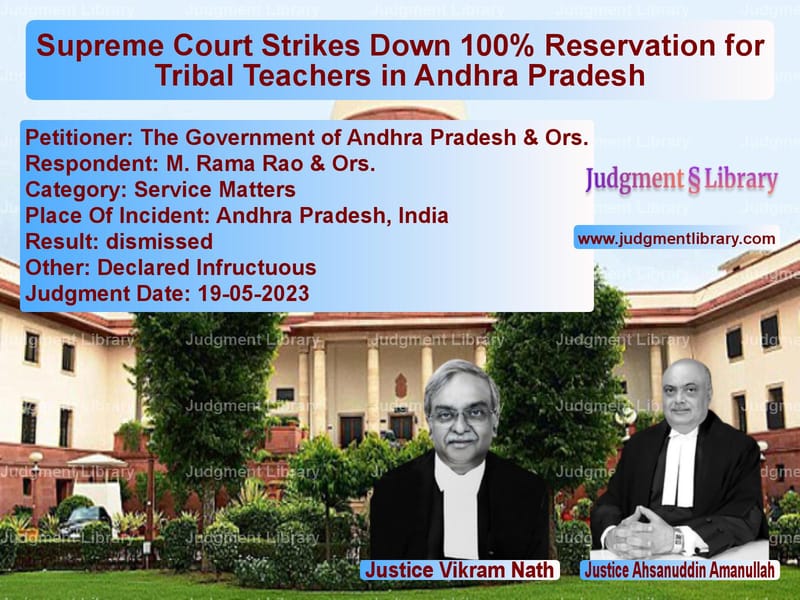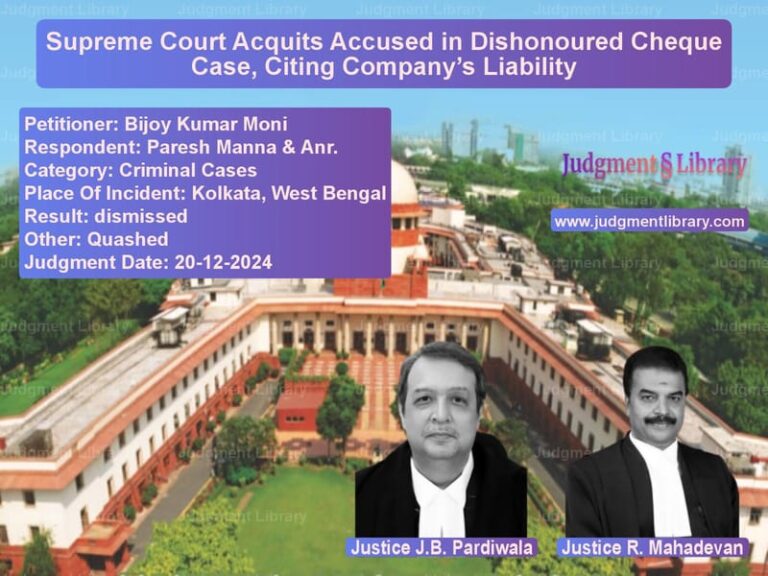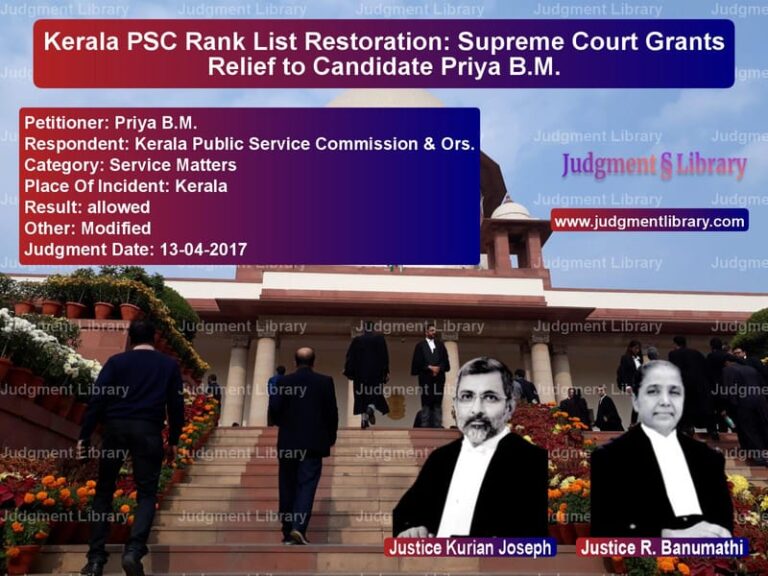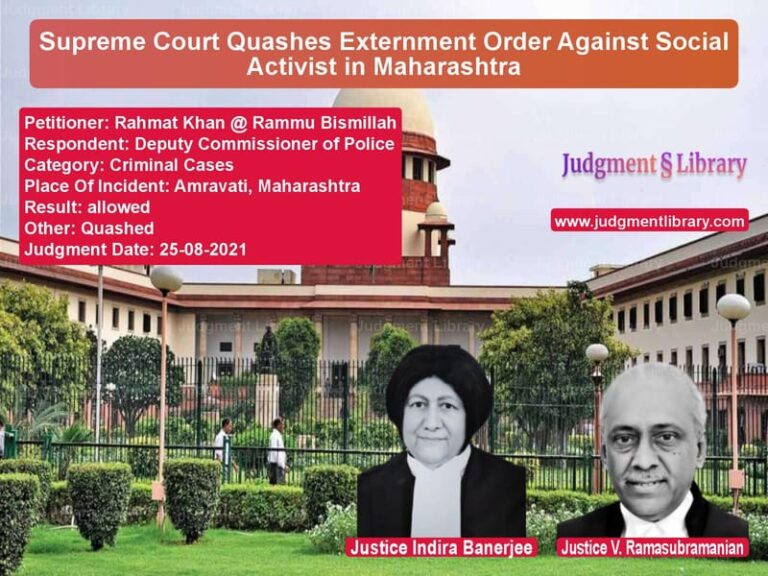Supreme Court Strikes Down 100% Reservation for Tribal Teachers in Andhra Pradesh
The case of The Government of Andhra Pradesh & Ors. vs. M. Rama Rao & Ors. is a landmark judgment concerning the legality of 100% reservation for Scheduled Tribes (STs) in teaching positions in schools located in Scheduled Areas. The Supreme Court reaffirmed the principle that reservation in government jobs cannot exceed 50%, setting a significant precedent for employment policies in India.
The case originated from a government order (G.O.Ms. No.3) issued by the Andhra Pradesh government on January 10, 2000, which provided 100% reservation for local Scheduled Tribe candidates for teacher posts in Scheduled Areas. Subsequently, two memos issued in 2009 and 2010 extended this reservation policy to include promotions and applied it retrospectively from November 5, 1986. The Andhra Pradesh Administrative Tribunal initially struck down these orders, but the High Court of Andhra Pradesh upheld them. The matter eventually reached the Supreme Court.
Background of the Case
The dispute began when the government of Andhra Pradesh issued G.O.Ms. No.3, mandating that only Scheduled Tribe candidates could be appointed as teachers in Scheduled Areas, effectively barring other eligible candidates from applying. The government later issued memos clarifying that this policy also applied to promotions and had retrospective effect from 1986.
Several affected individuals challenged the government’s decision, leading to a legal battle that culminated in the Supreme Court’s intervention. The case was heard alongside similar cases, and a Constitution Bench eventually ruled on the matter in Chebrolu Leela Prasad Rao & Ors. vs. State of Andhra Pradesh & Ors.
Petitioners’ Arguments
The petitioners, including non-tribal teachers and affected candidates, argued:
- Violation of Fundamental Rights: The 100% reservation policy violated Articles 14, 16(1), and 16(4) of the Indian Constitution, which ensure equality of opportunity in public employment.
- Exceeding Reservation Limits: The Supreme Court had previously ruled in Indra Sawhney vs. Union of India that reservation should not exceed 50%, yet the Andhra Pradesh government provided 100% reservation.
- Denial of Merit-Based Opportunities: The policy excluded qualified non-ST candidates from applying for teacher posts in Scheduled Areas, leading to unfair employment practices.
- Retrospective Application: Extending the policy back to 1986 created uncertainty and adversely affected many who had already been appointed under previous rules.
Respondents’ Arguments
The government of Andhra Pradesh defended its policy, stating:
- Upliftment of Tribals: The reservation was necessary to provide employment opportunities for local tribal populations, ensuring better education in Scheduled Areas.
- Government’s Power to Issue Reservations: Under Article 16(4), the government had the authority to provide reservations for backward classes.
- Historical Disadvantage: Tribals in Scheduled Areas had historically been deprived of quality education and employment opportunities.
- High Court’s Validation: The Andhra Pradesh High Court had upheld the validity of the policy, confirming its legal standing.
Supreme Court’s Analysis
The Supreme Court, in its ruling, considered multiple constitutional and legal aspects:
1. Reservation Should Not Exceed 50%
The Court reaffirmed the principle laid down in Indra Sawhney vs. Union of India that reservation should not exceed 50%. It noted:
“There was no rhyme or reason with the State Government to resort to 100% reservation.”
The judgment emphasized that exceeding the 50% limit violates the constitutional principle of equal opportunity.
2. Arbitrary and Unconstitutional Reservation
The Court found that the government’s decision was arbitrary and lacked justification. The judgment stated:
“It is unfortunate that illegal exercise done in 1986 was sought to be protected by yet another unconstitutional attempt by issuing G.O.Ms. No.3 of 2000 with retrospective effect of 1986.”
3. Protection of Existing Appointments
While striking down the reservation policy, the Court took a balanced approach by not disturbing appointments already made under the policy. It ruled:
“In the peculiar circumstance, we save the appointments conditionally that the reorganized States, i.e., Andhra Pradesh and Telangana, not attempt a similar exercise in the future.”
However, the Court warned that if the states attempted a similar illegal reservation in the future, all appointments made thereafter would be deemed unconstitutional.
4. Automatic Lapse of Related Government Orders
Since the Supreme Court had already quashed G.O.Ms. No.3, all subsequent memos and orders issued under its authority automatically lapsed.
Final Verdict
Based on its analysis, the Supreme Court ruled:
- The 100% reservation policy for tribal teachers was unconstitutional.
- The appointments already made under this policy would remain valid, but future attempts to reintroduce such a reservation would be struck down.
- The government of Andhra Pradesh and Telangana must not exceed the reservation limit in the future.
- All subsequent memos and government orders based on G.O.Ms. No.3 were rendered infructuous.
Implications of the Judgment
This judgment has significant implications for reservation policies in India:
- Reinforces Reservation Limits: The ruling reinforces the constitutional cap of 50% on reservations.
- Prevents Future Abuse: The Supreme Court explicitly warned state governments against exceeding the reservation limits.
- Ensures Equal Opportunity: The judgment upholds the right of non-tribal candidates to compete for government jobs.
- Establishes Judicial Precedent: The ruling serves as a strong precedent against excessive and arbitrary reservation policies.
By striking down the unconstitutional 100% reservation policy, the Supreme Court has upheld the principle of equality and ensured that reservation policies remain within constitutional limits.
Petitioner Name: The Government of Andhra Pradesh & Ors..Respondent Name: M. Rama Rao & Ors..Judgment By: Justice Vikram Nath, Justice Ahsanuddin Amanullah.Place Of Incident: Andhra Pradesh, India.Judgment Date: 19-05-2023.
Don’t miss out on the full details! Download the complete judgment in PDF format below and gain valuable insights instantly!
Download Judgment: the-government-of-an-vs-m.-rama-rao-&-ors.-supreme-court-of-india-judgment-dated-19-05-2023.pdf
Directly Download Judgment: Directly download this Judgment
See all petitions in Public Sector Employees
See all petitions in Recruitment Policies
See all petitions in Promotion Cases
See all petitions in Judgment by Vikram Nath
See all petitions in Judgment by Ahsanuddin Amanullah
See all petitions in dismissed
See all petitions in Declared Infructuous
See all petitions in supreme court of India judgments May 2023
See all petitions in 2023 judgments
See all posts in Service Matters Category
See all allowed petitions in Service Matters Category
See all Dismissed petitions in Service Matters Category
See all partially allowed petitions in Service Matters Category







